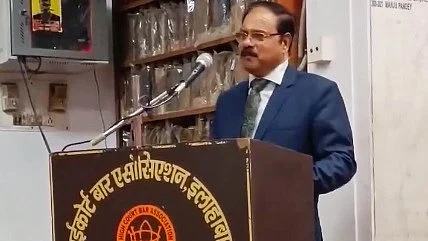What can Supreme Court do to discipline justice Shekhar Yadav?
SC can recommend the Allahabad HC judge's transfer or ask him to resign, failing which judicial work can be withdrawn from him

Even as a few BJP leaders have publicly come out in support of Allahabad High Court judge Shekhar Yadav, the legal fraternity is virtually unanimous that what he said publicly on Sunday was contrary to Constitutional provisions and values and against the oath he had taken to protect the Constitution.
Addressing a Vishwa Hindu Parishad meeting on the high court premises in Allahabad on the Uniform Civil Code (UCC), Justice Yadav had declared that the country would run according to the wishes of the majority, that law is what benefits the majority and makes it happy.
Shock, dismay and disbelief followed reports in the media, and the Supreme Court of India on Tuesday took the unprecedented step of issuing a press note stating that it had taken cognizance of the speech and had sought details from the chief justice of Allahabad HC.
MPs led by Ruhullah Mehdi of the National Conference have declared their intention to move a motion in the Lok Sabha for the impeachment of justice Yadav. The Campaign for Judicial Accountability and Reforms (CAJR) has written to the chief justice of India asking for an in-house inquiry and a number of lawyers’ bodies have condemned the partisan and ill-informed hate speech.
The CJAR said justice Yadav’s conduct in attending the event and delivering the controversial speech has “raised doubts in the minds of average citizens about the independence and neutrality of the judiciary, given the wide coverage it has received, a strong institutional response is needed”.
Justice Yadav’s actions and beliefs, the CJAR said, were “expressed in categorical words”, and “raise serious questions about his fitness as a judge, in particular, as a judge of a constitutional court such as the Allahabad High Court…his statements betray his inability to act with fairness, impartiality and neutrality in the discharge of his judicial functions”.
Former attorney-general C.K. Daftary, recalled senior advocate Sanjay Hegde, would say there were two kinds of judges — 'some were forward-looking while some would look forward’. Hegde quipped that justice Yadav’s speech sounded like a job application for a future role in political life and recalled that former Calcutta High Court judge Abhijit Ganguly would pull up the Mamata Banerjee government almost daily and is now a BJP MP, having won a Lok Sabha seat.
With justice Yadav retiring in 2026 and the UP Assembly election due in 2027, it was possible that he is the kind of judge who is ‘looking forward’.
Impeaching a judge is a long-drawn-out process. Signatures from at least 100 MPs would be required to move the motion. If and when it is accepted, Parliament would set up an inquiry committee which would submit its report to Parliament. It would then be debated in both Houses before the motion was put to vote. It could take years to impeach justice Yadav, if at all, with the government unlikely to support it.
There is, however, unanimity that the speech cannot be ignored. Justice Yadav not only used intemperate language directed at the Muslim community, he waded into a political issue which is likely to be dragged to court.
While some BJP-ruled states have tried to prepare a draft UCC and Uttarakhand claims to have implemented it, there is no draft UCC before Parliament, which alone can pass it. What is more, a UCC can only come about through consensus and not by force.
Justice Yadav ignored the history and mythology of Hindus littered with examples of men with multiple wives when he said that Muslims cannot be allowed to have more than one wife. Legally, a Muslim can have more than one wife but in practice, almost as many Hindus continue to practise bigamy illegally as Muslims — though the number for both communities is less than two per cent.
However, in terms of numbers, there would be many more bigamous Hindus than Muslims. It was the Hindu Marriage Act, vehemently opposed by many Hindus, which finally ended polygamy among Hindus.
Justice Yadav’s speech, in which he says non-Hindus in this country would have to be subservient to the majority, went against the fundamental rights guaranteed by the Constitution, against the oath that was administered to him, and also against the code of conduct for judges adopted by a full court of the Supreme Court in 1997. It betrayed the Constitution of which secularism remains a basic feature. It was unbecoming of a judge of a constitutional court and is likely to have sent out a wrong signal to the subordinate courts.
Follow us on: Facebook, Twitter, Google News, Instagram
Join our official telegram channel (@nationalherald) and stay updated with the latest headlines
